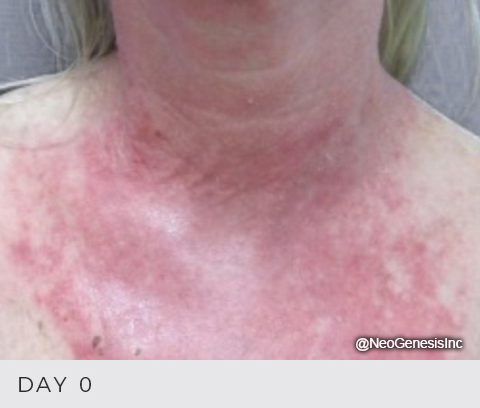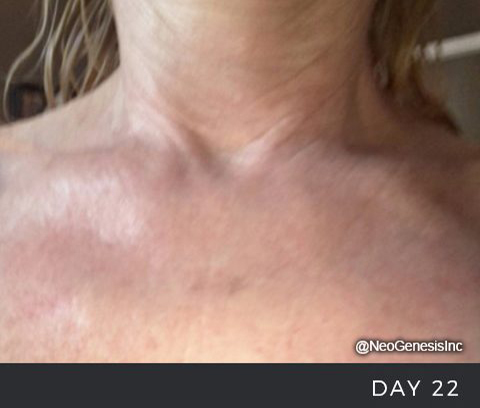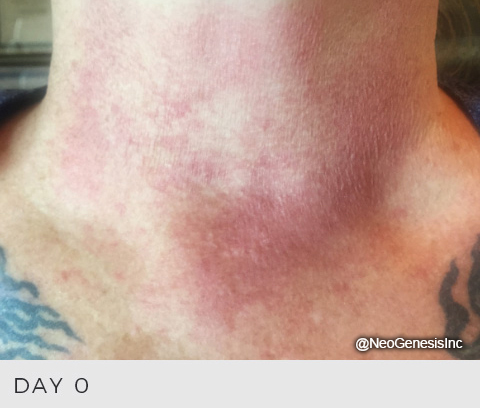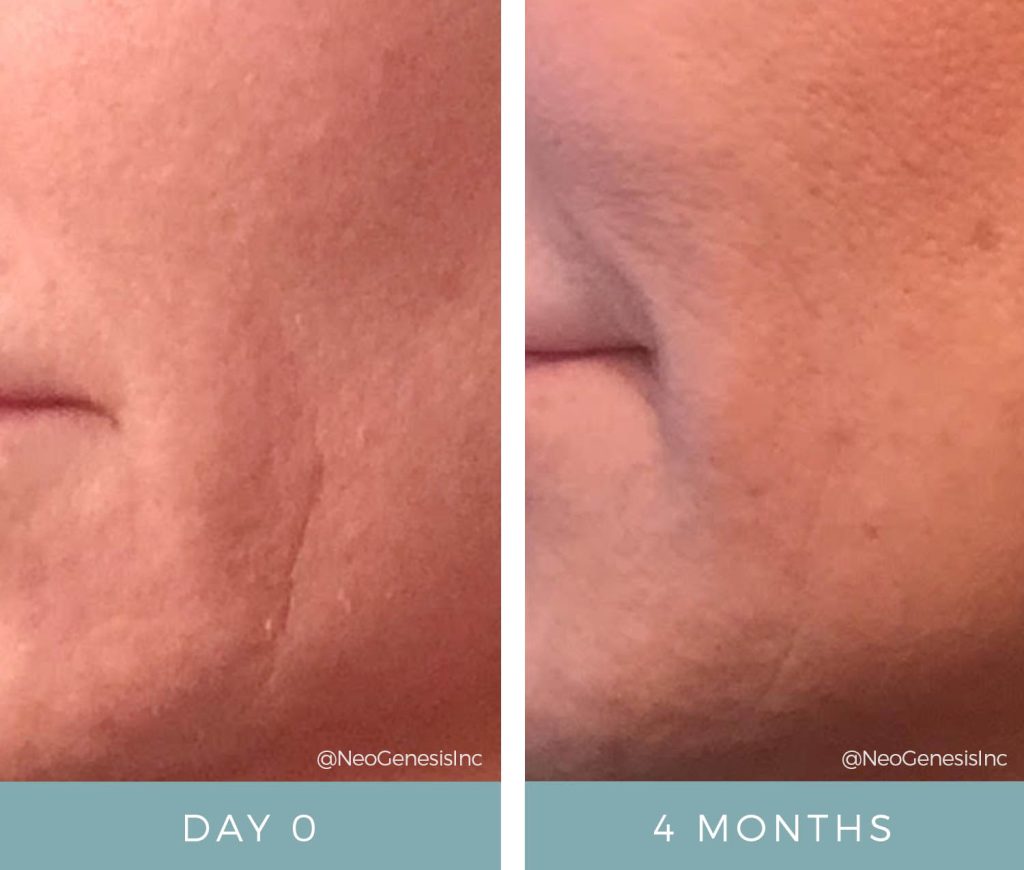Chemical Peel



“I have been using the NeoGenesis product, Recovery, for a chemical burn and side effects from radiation. Prior to radiation (in late July), I had a plastic surgeon remove the scar tissue in my breast resulting from a lumpectomy. Unfortunately, I simultaneously opted to include an elective procedure of a laser and chemical peel, which resulted in severe blistering and burning. Recovery truly relieved my discomfort. At this time there is almost no scarring. In mid-August, I started radiation. I used Recovery daily and surprised all of the technologists and doctors (especially since I have Lupus), as I did not peel, blister, or scar. My skin darkened for a week or two, and that has also dissipated. I am still using Recovery to help with the darkness from radiation. Your product Recovery saved the day. I hope other cancer patients have the opportunity to use your skincare products to save their skin.” – Denise W.
FEATURED VIDEOS
CHEMICAL PEEL + RADIATION
Chemical peels are a popular cosmetic procedure that involves using a chemical solution to remove the top layers of skin from the face, neck or hands. This process is used to improve the overall appearance and texture of the skin by addressing concerns such as wrinkles, acne scars, age spots and uneven pigmentation.
There are different types of chemical peels available, ranging from light to deep peels, which vary in their ingredients and strength. Light peels usually use mild acids like alpha-hydroxy acid (AHA) or beta-hydroxy acid (BHA) to exfoliate the top layer of skin, while deeper peels use stronger acids like trichloroacetic acid (TCA) or phenol to penetrate deeper into the skin.
After undergoing a chemical peel, it is important to take proper care of your skin to ensure optimal healing and results. Here are some essential post-treatment skin care tips to follow:
- Avoid sun exposure: After a chemical peel, your skin will be more sensitive to the sun’s harmful rays. It is crucial to avoid direct sun exposure for at least a week after the peel and always wear sunscreen with SPF 30 or higher when going outside.
- Keep your skin hydrated: Chemical peels can leave your skin feeling dry and tight, so it is important to use a gentle moisturizer regularly to keep it hydrated. Look for moisturizers that contain ingredients like hyaluronic acid, glycerin, or ceramides to help restore moisture and strengthen the skin barrier.
- Use gentle products: Your skin will be more delicate after a chemical peel, so it is important to avoid using harsh or irritating skincare products. Stick to mild cleansers, toners, and moisturizers that are specifically formulated for post-peel care.
- Avoid exfoliating: Chemical peels already work to remove dead skin cells, so it is best to avoid using any additional exfoliating products or tools. These can irritate the skin and hinder the healing process.
- Be patient: It takes time for your skin to heal and reveal the full results of a chemical peel. Avoid picking at any flaking or peeling skin as this can lead to scarring or infection. Be patient and trust the process.

“I have been using the NeoGenesis product, Recovery, for a chemical burn and side effects from radiation. Prior to radiation (in late July), I had a plastic surgeon remove the scar tissue in my breast resulting from a lumpectomy. Unfortunately, I simultaneously opted to include an elective procedure of a laser and chemical peel, which resulted in severe blistering and burning. Recovery truly relieved my discomfort. At this time there is almost no scarring. In mid-August, I started radiation. I used Recovery daily and surprised all of the technologists and doctors (especially since I have Lupus), as I did not peel, blister, or scar. My skin darkened for a week or two, and that has also dissipated. I am still using Recovery to help with the darkness from radiation. Your product Recovery saved the day. I hope other cancer patients have the opportunity to use your skincare products to save their skin.” – Denise W.
FEATURED VIDEOS
CHEMICAL PEEL + RADIATION
Chemical peels are a popular cosmetic procedure that involves using a chemical solution to remove the top layers of skin from the face, neck or hands. This process is used to improve the overall appearance and texture of the skin by addressing concerns such as wrinkles, acne scars, age spots and uneven pigmentation.
There are different types of chemical peels available, ranging from light to deep peels, which vary in their ingredients and strength. Light peels usually use mild acids like alpha-hydroxy acid (AHA) or beta-hydroxy acid (BHA) to exfoliate the top layer of skin, while deeper peels use stronger acids like trichloroacetic acid (TCA) or phenol to penetrate deeper into the skin.
After undergoing a chemical peel, it is important to take proper care of your skin to ensure optimal healing and results. Here are some essential post-treatment skin care tips to follow:
- Avoid sun exposure: After a chemical peel, your skin will be more sensitive to the sun’s harmful rays. It is crucial to avoid direct sun exposure for at least a week after the peel and always wear sunscreen with SPF 30 or higher when going outside.
- Keep your skin hydrated: Chemical peels can leave your skin feeling dry and tight, so it is important to use a gentle moisturizer regularly to keep it hydrated. Look for moisturizers that contain ingredients like hyaluronic acid, glycerin, or ceramides to help restore moisture and strengthen the skin barrier.
- Use gentle products: Your skin will be more delicate after a chemical peel, so it is important to avoid using harsh or irritating skincare products. Stick to mild cleansers, toners, and moisturizers that are specifically formulated for post-peel care.
- Avoid exfoliating: Chemical peels already work to remove dead skin cells, so it is best to avoid using any additional exfoliating products or tools. These can irritate the skin and hinder the healing process.
- Be patient: It takes time for your skin to heal and reveal the full results of a chemical peel. Avoid picking at any flaking or peeling skin as this can lead to scarring or infection. Be patient and trust the process.






